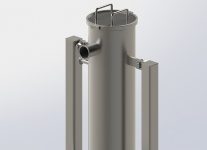Look out Colombia. And stand back, Brazil: Myanmar coffee is coming.
Workers sort coffee beans in Shan State’s Mya Zedi Village, Ywarngan township. Photo: Supplied
By Su Phyo Win | Wednesday, 26 October 2016
Though coffee has been grown in this country for 100 years, production volumes were low and the quality was hidden under a bushel. But now international aficionados are starting to take Myanmar seriously as a producer of first-class joe.
Marcelo A Pereira Magnere, a smallholder expert from USAID, will be helping to bring about this transformation through a rural development concern, Winrock International.
“I started working more than a year ago in Ywarngan township, Shan State. The idea was to promote incentives for the coffee industry in Myanmar,” he said. “The industry has a lot of potential but it’s never been achieved. So when the coffee is exported, it can’t compete with larger-volume producers like Brazil and Colombia.”
Other producers offer larger volume at a lower price. “But Myanmar coffee is excellent, one of the best I’ve ever tried anywhere in the world,” he said, adding that so far, nobody has sufficiently appreciated the country’s potential. Last July, for the first time in decades, 40 metric tonnes of Myanmar coffee was exported to the United States.
“Everyone loved its amazing quality. And this year, we’re working with five times as many farmers and will be able to export five times as much,” he said.
Until the 1980s, coffee was valued mainly as a source of pick-me-up caffeine. But now, quality, aroma and flavour matter. Standards have risen as drinkers recognise the real thing.
“People started to pay more for good coffee,” said Mr Magnere.
But Myanmar didn’t respond.
“They didn’t know they could access this market,” he said, saying it was time to introduce quality local product to coffee drinkers.
“Local consumers don’t recognise the quality and anyway, they don’t want to pay for it. People need to understand that it’s not just about caffeine. Over the next few years, as tastes become more refined, people will be willing to pay more.”
Competitors like Brazil, Vietnam and Colombia produce much larger tonnages and so enjoy a larger share of the world market, he said.
“In terms of volume, Myanmar isn’t significant. They have to compete on grounds of quality. Myanmar coffee is better quality than Brazil, Colombia and Vietnam,” he said, saying the local product rivalled that of Kenya and Ethiopia.
“Quality is no accident,” he warned. “We’re focusing on making the industry aware of its potential, and its opportunities.”
The president of the Myanmar Coffee Association (MCA), U Ye Myint, said the two key requirements were speciality coffee and value-added.
“We have people interested in Europe, Australia, New Zealand and in the US. USAID is funding Winrock International, and MCA is trying to develop the whole value chain,” he said, adding that the potential market was “huge”.
“The government has a role in maintaining peace and supporting the development of the industry,” he said, with speciality coffee selling for up to US$7000 a tonne, twice the price of ordinary joe.
People had to be persuaded that it was worth switching from the instant brew to the real thing, on grounds of quality, or even health.
Daw Lay Lay Myint, managing director of Genius Coffee, said she looked forward to the day when coffee branded “Made in Myanmar” could penetrate the global market.
“We can’t let people just keep drinking instant coffee mix,” she said. “We can produce very high-quality coffee, especially in Shan State, but nobody can afford it. We’re focusing on quality.”
On October 22, a little-noticed exhibition of Arabica coffee in Yangon showcased to weekend shoppers just what coffee from Myanmar could be like.





















